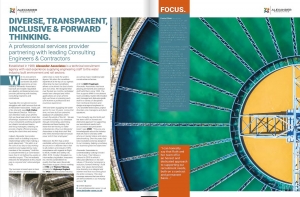Alexander Associates
Portia Moon
Chelvi Nava
In this video, Ruth meets Chelvi Nava, a renowned engineer and writer, and an advocate for encouraging young people into the world of engineering.
Katherine Parsons
In this episode, Ruth talks to Katherine Parsons of ISS, who is not only a highly successful engineer, but she's an award-winning D&I speaker and a champion of diversity.
Chris Constantinides
What is Alexander Associates 3.0?
Alexander Associates, a leading recruitment agency with a storied history, is marking its next phase of evolution and growth; introducing 'Alexander Associates 3.0'.
Established in 1989 by [Jayn Gutteridge and Stavros Koukoumbris], Alexander Associates has long embodied the principles of hard work and delivering the best possible results for clients and candidates across the UK.
Eager to extend the legacy built by the founders, current owners Peter Webb, Ruth Parker and Gareth Jones resolved to carry on their work with a management buyout in 2016, which led the business through its 2.0 era.
"When we sat down with our senior team members, we discussed who we are, where we came from and who we wanted to be. The line that kept coming up is 'we're proud of our legacy'. Alexander Associates was already an amazing business with the core values of honesty, transparency and hard work. We're very proud of that, so that's why we bought the business," says managing director Gareth Jones.
Since 2019, Alexander Associates has entered its 3.0 phase, marking the new chapter with a revamp of the brand, a new focus on expanding the services available to clients and candidates and launching new offices in Brasted, Kent and London.
The company, which specialises in the Civil & Structural Engineering, Water, and Mechanical & Electrical sectors, has recently expanded into Residential Development. New Associate Directors Chris Constantinides and Scott Doody have been appointed to manage the latest vertical in London and have added three new trainees to their team.
"We're proud of our legacy, and excited about our future," Jones says
To help clients and candidates navigate challenging markets, Alexander Associates' teams are utilising their wisdom gained from experiences including Brexit, three IR35 changes and the COVID-19 lockdowns, he adds.
Alexander Associates' intimate knowledge of its clients is one of the key strengths that has enabled the company to expand its services into new areas.
"We've seen the market change a lot, with the growth of master vendors, neutral vendors, and internal recruiters. We've learned a huge amount from those processes, and we've got something different to offer," Jones says.
“There is much potential to engage with clients about strategies for diversifying their supply chains and increasing competition and collaboration amongst suppliers, as well as finding alternatives to master vendors,” he adds. "To do that, we need to continue working with talent we've got inside the business, and to bring in new talent."
The next five years are set to be even more exciting than the past five, notes director Peter Webb.
“There are so many opportunities out there that we can grab and are currently grabbing. We’ve got an amazing team with us that can really help us succeed,” Webb says.
Jones expects that, despite its anticipated business growth, the core Alexander Associates values of honesty, transparency and hard work will be front and centre.
“We don’t want to be a Plc, but we do want to be the largest independent agency in the UK that specialises in our fields. We want to be a large niche agency with specialist services.”
To find out more about how Alexander Associates can help you find quality talent, or if you’re interested in the recruitment career pathways we can offer, get in touch today.
Welsh Water has gone out to tender with a raft of contracts under its £2.9 billion AMP7 2020-25 capital investment programme, with the potential to extend by up to three further years into AMP8.
Welsh Water has gone out to tender with a raft of contracts under its £2.9 billion AMP7 2020-25 capital investment programme, with the potential to extend by up to three further years into AMP8.
The water company has tendered a total of separate contracts which awarded will be for an initial 5-year period with options to extend for a further 3 years in total.
The contracts are:
- Major Civil Works covers a wide range of major civil engineering works requirements, across the DCC operating region - up to 6 suppliers to be appointed to the framework agreement
- Minor Civil Works - wide range of minor civil works requirements, including planned, reactive and emergency response, within the DCC operating region. Up to 3 suppliers to be appointed to the framework agreement
- Major Electrical Works – up to 6 suppliers to be appointed to the framework agreement
- Minor Electrical Works - covers a wide range of minor electrical works requirements, including planned, reactive and emergency response. Up to 3 suppliers to be appointed to the framework agreement
- Major Mechanical Works - up to 6 suppliers to be appointed to the framework agreement
- Minor Mechanical Works - up to 3 suppliers to be appointed to the framework agreement
- Interested suppliers who wish to tender for any of the contracts must be registered on the DCC eSourcing Portal.
Time limit for receipt of tenders or requests to participate is 4th September 2020
A brand new train station in Leeds which could cost up to £22 million has been given the go ahead.
Leeds City Council has approved the decision for a new two-platform station to be built near the White Rose Shopping Centre in Beeston, Leeds.
It will be located on the Leeds to Dewsbury section of the main trans-Pennine rail line, and in addition to serving the White Rose office park and shopping centre , it would also connect communities including Cottingley, Churwell, Middleton and Milshaw.
Platforms at the station will accommodate six-carriage trains, with space to expand to accommodate those with eight carriages in the future.
At least two trains per hour will pass through the station in each direction.
Along with the new station, two three-storey station buildings will be built (one on either side of the railway line), as well as canopy walkways, cycle parking, disabled parking spaces and "pick up and drop off" points.
It is estimated that once the station is built, 340,000 trips will be made annually, and that it could support the creation of 10,000 jobs.
Never miss a thing from across Yorkshire. Sign up for the newsletter of your choice here
£2.61 million of funding to develop the station was previously granted by West Yorkshire Combined Authority in November, with the project estimated to cost £22 million overall.
In the report approving the decision, a Leeds City Council planning officer said: "The proposal would provide an opportunity for the growth of a sustainable transport mode that would facilitate the growth of the local economy and local existing and future residential communities.
"The proposal seeks to develop a parcel of land with a railway station and associated infrastructure that will be integral to supporting the local communities’ needs and the long term economic growth of an area that is identified as a regeneration priority."
No confirmation as to what will happen with Cottingley train station - considered likely to close with the development of a White Rose station - has yet been announced.
Building will commence within the next three years, with February 2021 estimated to be the earliest start date.
High Speed 2 Ltd (HS2) has launched contract opportunities with a combined value of more than £1bn.
Contracts for tunnel fit-out, overhead catenary systems and communications installation have all been put out to tender in the last few weeks.
Combined they are worth more than £1bn, with the tunnel fit-out contract valued at £498M, while both the overhead catenary systems job and the communications contract are priced at £300M each.
All contracts cover phase one of the line between London and Birmingham, and have the option to extend to cover phase 2a to Crewe.
It comes after the government gave notice to proceed, paving the way for construction of phase one.
The project promoter has also announced a huge recruitment drive as it ramps up towards main construction on phase one. 500 new jobs have been put out to the market across a range of disciplines, from engineering and project management to land and property, procurement and commercial.
Over 300 of the roles will be based in Birmingham, West Midlands, and the new roles announced today will push the total number of jobs the project has supported to over 10,000 once recruited.
HS2 Minister Andrew Stephenson said: “These jobs are a welcome boost for workers across the country at this challenging time, providing the opportunity to play a crucial part in delivering HS2, an integral part of improving connectivity and levelling up our country.
“We continue to work with the transport and construction industry to accelerate projects, where safely possible, to kickstart our economy, provide more employment opportunities and drive our recovery as we build out of Covid-19.”
Later this year, HS2 Ltd is also expected to launch procurement on its high voltage power supply contract, as well as starting the hunt for contractors to work at the Washwood heath depot.
Contracts relating to phase 2a civils (Main Works Design and Delivery Partner) and construction of Birmingham Interchange are also due to go out to tender later this year.
Boris Johnson is sweeping in radical reforms to the planning system to allow vacant buildings in town centres to be converted to housing.
Under the new rules, existing commercial properties, including newly vacant shops, can be converted into residential housing more easily, in a move to kick start the construction industry and speed up rebuilding.
He also said the government will launch a planning Policy Paper in July setting out comprehensive reforms to England’s seven-decade old planning system to introduce a new approach that works better for our modern economy and society.
The changes which are due to come into force from September will allow a wider range of commercial buildings to change to residential use without the need for a planning application.
Also builders will no longer need a normal planning application to demolish and rebuild vacant and redundant residential and commercial buildings if they are rebuilt as homes.
More types of commercial premises will be able to be repurposed without planning.
So a building used for retail could be able to be permanently used as a café or office without requiring a planning application and local authority approval.
Pubs, libraries, village shops and other types of uses essential to the lifeblood of communities will not be covered by these flexibilities.
Under the reforms property owners would also be able to build additional space above their properties via a fast track approval process, subject to neighbour consultation.
Johnson said the changes to the law, would both support the high street revival by allowing empty commercial properties to be quickly repurposed and reduce the pressure to build on green field land by making brownfield development easier.
Developers will still need to adhere to high standards and regulations, just without the unnecessary red tape.














